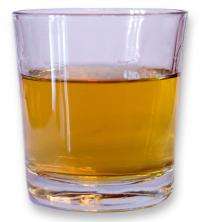September 26, 2012 report
Celtic Renewables aims to process next-gen biofuel

(Phys.org)—A distillery agreement between two companies in Scotland is to turn whiskey byproducts into fuel. Those who look forward to a bright future of biofuels that are easier on the environment will be interested in their story. The two companies will strive to combine two byproducts of whisky production, "pot ale" and "draff," to produce renewable products, including next-generation butanol, or biobutanol. The pot-ale refers to residue from the stills. The draff refers to what is left of the grains. Bacteria feeding on the byproducts can produce butanol. The production of butanol by biological means was first performed by Louis Pasteur in 1861, but has recently taken on revived interest.
Celtic Renewables and independent malt whisky producer Tullibardine have signed a memorandum of understanding. Together they will apply their process to thousands of tons of the distillery's leftovers.
Biobutanol is a 4-carbon alcohol (butyl alcohol) that enthusiasts say is the world's next biofuel because of its environmental characteristics. It is said to have a superior energy content to ethanol, delivering better fuel economy and miles per gallon; it can be blended with gasoline to potentially reduce greenhouse gas emissions; and it can be produced using existing ethanol production facilities with few modifications. It is said to be less susceptible to separation in water than standard ethanol-gasoline blends and less corrosive than ethanol.
Those asking if biobutanol can be a sustainable vehicle fuel are told there has been progress in methods of fermentation. That is where the whiskey comes in. A team at Celtic Renewables in Scotland has invested considerable research in seeing how the malt whiskey industry can serve as a viable resource for developing next-generation butanol.
Celtic Renewables as a start-up company is out to commercialize its process for making a superior biofuel. They believe the enormous numbers of liters of pot ale and tons of draff can be converted into biofuel as a direct substitute for fossil-derived fuel. As a result, there would be a reduction in oil consumption and CO2 emissions, while providing a boost for rural areas where the whisky industry is prevalent. To propel their project, Celtic Renewables has made a deal with whisky maker Tullibardine to convert byproducts to biobutanol.
Mark Simmers, CEO of Celtic Renewables, said biobutanol that it makes from whisky waste is better suited as vehicle fuel than the bioethanol commonly pumped now. Celtic Renewables is in a trial phase of production, but it hopes to be producing biobutanol for the commercial market by the end of next year.
Professor Martin Tangney, founder, said the partnership with Tullibardine "is an important step in the development of a business which combines two iconic Scottish industries - whisky and renewables." The project is supported by a grant from the Scottish government's Zero Waste Scotland initiative.
© 2012 Phys.org



















